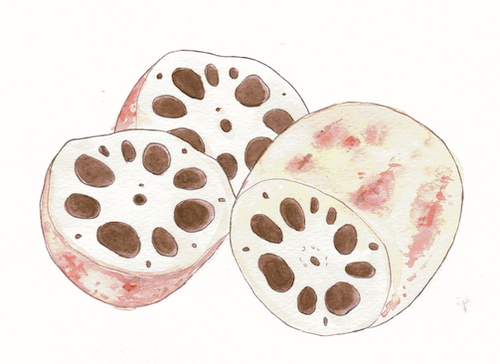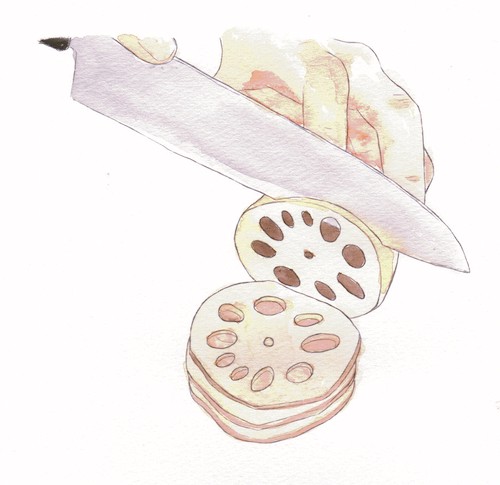
The good fortune of eating your vegetables
I was first introduced to lotus root when I was a child, when I’d fly back to Japan to visit my grandmother in the summer. Adamant that I get more exposure to Japanese foods, she would always bring home and cook with whatever she felt I couldn’t get in the United States.
“Look Kaki-chan, see what I brought home for you today — I bet you’ve never seen a vegetable like this one!”
“Um grandma, why does it have holes?”
Undeterred by my hesitation, she declared, “These holes are really important. The lotus root is magic you see: it allows light to pass through, so you can call forth and see a bright future.” I picked it up and peered through the holes, suddenly curious about its so-called powers.
My grandmother wasn’t lying when she said it was special — lotus root is often used in Japanese New Year’s dishes, to bring good luck for the new year. Also known as renkon (蓮根), it originated in India and traveled across to East Asia about 2,000 years ago, and has been used in East Asian cuisines for centuries, notably in Japanese and Chinese dishes. Rich in iron, vitamin C, and compounds that help aid cardiovascular health, it is a valuable ingredient in Traditional Chinese Medicine.
If you’ve never held a lotus root, you’d be surprised by how light it is. It is naturally hollowed out, and isn’t as dense as most starchy vegetables, which allows it to remain crunchy even after being cooked. While you could deep-fry the vegetable with batter or into proper chips, because it is naturally so crunchy, a simple sear on a pan with some salt and pepper is all you need to do to recreate a heartier version of your favorite potato crisps. You can also braise it, pickle it, grill it, or sauté it. Mince it into a tofu burger or stir it into a curry. Versatile in use, I could probably name about 15 different dishes I love that use lotus root.
It’s now been a while since I’ve looked at the lotus root like it was a magical ingredient, but I guess in ways it really is so. It’s made me more open to new foods, refine my own home cooking skills, and see vegetables as something historically and culturally multifaceted rather than something to just fuel my body. It’s changed the way I look at health, and has improved the way I take care of my body for a lifetime.
And a vegetable which brings good luck? Don’t mind if I do.
